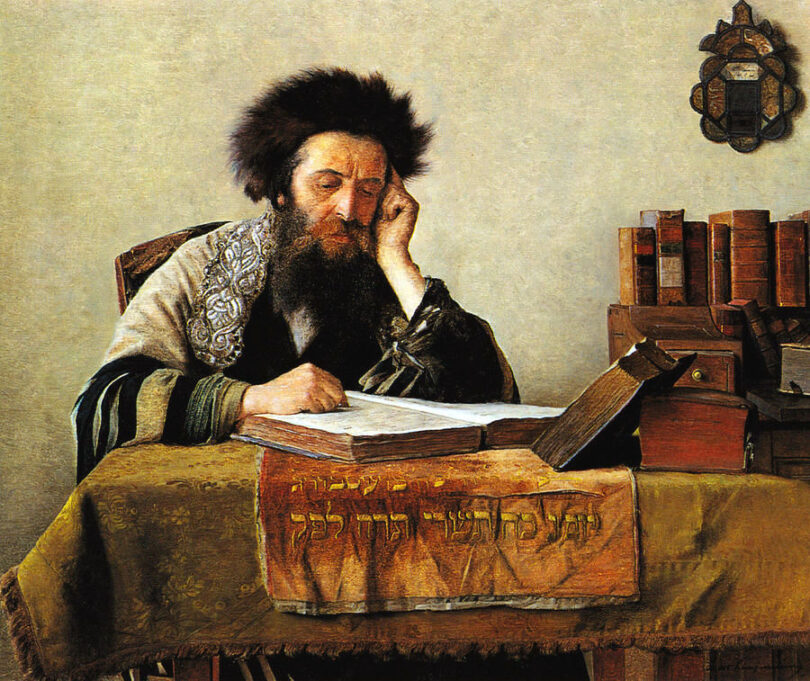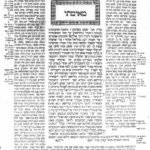
 This would, no doubt, turn into a massive page during the project going through the entire cycle. What I’m going to do is put the section of whichever tractate I’m currently going through on this page, and as I finish them during the cycle, I’ll move the finished one onto a separate linked sub-page. I’m going to organize it as an outline so it’s reasonably easy to follow. I’m also, while well aware of the deep spiritual stuff that’s going on in each discussion, not going to go down that path – there are a zillion websites and commentaries that already do that. In general, I find the idea of a glimpse of a historical culture from what amounts to transcripts of conversations between spiritual and secular leaders to be fascinating, and not surprisingly, for me, I’m particularly drawn to topics that relate to food and wine, sexuality, and comedy.
This would, no doubt, turn into a massive page during the project going through the entire cycle. What I’m going to do is put the section of whichever tractate I’m currently going through on this page, and as I finish them during the cycle, I’ll move the finished one onto a separate linked sub-page. I’m going to organize it as an outline so it’s reasonably easy to follow. I’m also, while well aware of the deep spiritual stuff that’s going on in each discussion, not going to go down that path – there are a zillion websites and commentaries that already do that. In general, I find the idea of a glimpse of a historical culture from what amounts to transcripts of conversations between spiritual and secular leaders to be fascinating, and not surprisingly, for me, I’m particularly drawn to topics that relate to food and wine, sexuality, and comedy.
- Seder Zeraim – “Book of Seeds”
- Berakhot – “Blessings” – Blessed things, actions, and events
- I hit a momentary “WTF?” when Berakhot finished and we didn’t move on to Pe’ah, the next tractate in Zeraim. Apparently the remaining ten tractates in Zeraim do not have Gemara commentary in the Babylonian Talmud, just the Jerusalem Talmud, which the Daf Yomi doesn’t cover. Despite living in a predominately agrarian society, the Babylonian rabbis apparently had nothing to say on agriculture and related subjects like tithing, offerings, and challah bread. Though now I get “Book of Seeds”, I do feel a bit cheated and I want to know if there’s a good challah recipe in there. My plan is to at some point read through the various tractates throughout the Talmud that aren’t included in the Daf Yomi, just out of curiosity. I’ll put those in a different color so that they stand out.
- Pe’ah – “Corner” – Pay it Forward
- Demai – “Doubtful” – Provenance and Taxes
- Kil’ayim – “Mixed Species” – Mixing it up in the Fields
- Shevi’it – “Seventh” – Taking a Sabbatical from Life
- Terumot – “Donations” –
- Ma’aser Rishon – “First Tithes” –
- Ma’aser Sheni – “Second Tithes” –
- Challah – “Dough” –
- Orlah – “First Fruits of Trees” –
- Bikkurim – “First Fruits” –
- Seder Moed – “Book of Festivals”
- Shabbat – “Sabbath” – The Day of Rest
- Eruvin – “Community Spaces” – Creating Shared Space
- Pesachim – “Passovers” – Recreating the Jewish People
- Shekalim – “Shekels” – Taxes of Renewal
- Yoma – “The Day” – Hard to Say I’m Sorry
- Sukkah – “The Hut” – Founding the Jewish Nation
- Beitza – “The Egg” – Making it all Social
- Rosh Hashanah – “Head of the Year” – Finding Yourself in Time
- Ta’anit – “The Fast” – Hunger Strikes
- Megillah – “Scroll” – Rules of the Read
- Mo’ed Katan – “Little Festival” – What Can You Do?
- Chagigah – “Festival Offering” – Nu, What Can I Bring?
- Seder Nashim – “Book of Women”
- Yevamot – “Brother’s Wife” – Clan Survival
- Ketubot – “Written” – I Do
- Nedarim – “Vows” – I Won’t
- Nazir – “Abstinent” – I’m Yours Forever… or a Month
- Sotah – “Errant Wife” – How Can I Trust You Again?
- Gittin – “Divorce Documents” – Parting Glances
- Kiddushin – “Betrothal” – You’re Mine, All Mine!
- Seder Nezikin – “Book of Damages”
- Bava Kamma – “The First Gate” – Who’s Responsible?
- Bava Metzia – “The Middle Gate” – Who Owns the Truth?
- Bava Batra – “The Last Gate” – You’re Responsible, and Here’s Why
- Sanhedrin – “Assembly” – Judging You
- Makkot – “Lashes” – Whip It, Whip It Good
- Originally, Makkot was simply the second part of Sanhedrin, the tractate we just finished. While the former focused on the design of the court system and its overall responsibilities for various types of crimes, Makkot focuses on the Bet Din, the Halakhic court, i.e., the rabbinical court that judges violations of religious law. More specifically, the tractate covers three subjects: false witnesses (thou shalt not lie/bear false witness); sanctuary cities (you thought those were a new, California based thing, right?); and punishment by flogging (lashes).
- 4/10/25, Chapter 1, Page 2 – In Sanhedrin we covered mostly crimes that were punishable by the death penalty. As an intro to “bearing false witness”, the rabbis note that in a case where one conspires to have someone put to death by the courts and is later found to have lied, he is punished with the same penalty he sought for his victim. In cases that involve a different punishment, the same is considered the standard – a similar monetary fine, or jail time as was sought. But, in some cases, that either isn’t possible, or would have adverse consequences on innocents, like the liar’s children, and instead, the court opts for public flogging as a deterrent.
- 4/11/25, Page 3 – Rav Yehuda, out of the blue in a discussion about loan repayment, announces that the act of cutting the fabric of a shirt to create the neck opening violates the Sabbath prohibitions on work. Rav Kahana objects, noting that one is allowed to remove the stopper from a wine barrel to create an opening. Rava says he’s full of it, after all, one isn’t drilling the opening, which would be prohibited, but just removing the stopper, which is a part of its purpose. My takeaway, wine corks exist to be removed!
- 4/12/25, Page 4 – Another tangent and a mildly deep dive into mikvahs, the ritual baths. The water in these must be naturally occurring, more or less stagnant, water and cannot be directly transported by human intervention. So, rainwater, seawater, lake water, but not river water, which is constantly moving. If you top up a ritual bath with non naturally collected water, like, say a barrel from a tap, there are limits on the ratio of that that affect the purity of the bath, but if you stay below that, it is assumed that the impure water becomes purified on contact with the purified. Not so for other substances, like spilled wine, which it is recommended you drink rather than bathe in.
- 4/13/25, Page 5 – A pair of witnesses swear that they overheard an accused murderer plotting to kill someone on, say, Tuesday, June 14th. But later, a second pair of witnesses comes forward to point out that on that Tuesday, the first witnesses were somewhere else. The first pair realize they’ve made a mistake, it was Wednesday, June 15th when they overheard the plot. No matter to the rabbinical court, clearly they were conspirators, and even though the murder actually took place, as they said, the court sentences them to death for the conspiracy. We all know that eyewitness testimony is unreliable when it comes to details. Clearly these rabbis didn’t watch enough cop shows.
- 4/14/25, Page 6 – I’m a bit confused trying to follow this particular passage. They’re talking about disqualifying witnesses because of their personal relationship to either a murderer or sodomizer, both acts seem to be equally repugnant to those involved in the discussion. First, the rabbis pretty much all agree that the murderer or sodomizer is disqualified as a witness because of his personal stake in the outcome of the trial, so no testifying on his own behalf. But then, the victim – a sodomized victim is disqualified as a witness if he saw who did it to him, he can only testify if he was “taken from behind”, and then only to things unrelated to the identity of the sodomizer. But then, the real twist… a murder victim is disqualified from testifying because of his personal stake in the matter… umm, isn’t a murder victim… dead?